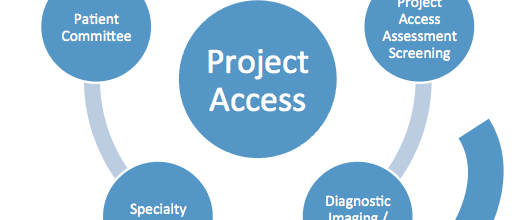Imaging technologies are an important diagnostic service frequently needed by primary care providers to provide high-quality care.
Imaging technologies include standard x-rays, mammography, ultrasound, computed tomography (CT scan), magnetic resonance imaging (MRI), dual energy x-ray absorptiometry (DEXA) scans for bone density, nuclear medicine scans, and interventional radiologic procedures such as angiograms. Standard x-rays and ultrasounds can be considered lower-cost, with the other services being high-cost. For imaging services, the two main problems facing Community Health Centers (CHCs) are access—both timely access and, most importantly, financial access for the uninsured—and quality—ensuring that imaging reports are promptly returned to primary care and that proper patient follow-up is provided for abnormal studies.
Medicaid patients have reasonable financial access to both lower-cost and high-cost imaging, though high-cost services may require payer authorization. Medicaid patients may have more difficulty with prompt, timely access, but imaging facilities and radiologists often participate in Medicaid. For example, Medi-Cal payment for CT head scans is 75% of the Medicare payment. In one study, only 2% of Medicaid CHC patients had difficulty accessing diagnostic testing (low-cost), with 16% reporting problems receiving high-tech (high-cost) services1.
Yet, for uninsured patients, imaging services, especially high-cost services, are virtually inaccessible. A limited number of imaging facilities provide significantly reduced rates for the uninsured. Lower-cost imaging facilities are most accessible financially for the uninsured if they are available within the CHC, where sliding scale rates greatly improve affordability. Because imaging services for Medicaid patients do not appear to create major problems, we focused on strategies to promote integration of imaging services for the uninsured through colocation, internal capacity building or some domain of coordination. Many of the strategies we found cross multiple domains.
Find this useful or interesting? We’re constantly sharing stuff like this. Sign up to receive our newsletter to stay in the loop.




